7 start with R start with R
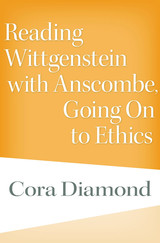
In Reading Wittgenstein with Anscombe, Going On to Ethics, Cora Diamond follows two major European philosophers as they think about thinking, as well as about our ability to respond to thinking that has miscarried or gone astray. Acting as both witness to and participant in the encounter, Diamond provides fresh perspective on the importance of the work of these philosophers and the value of doing philosophy in unexpected ways.
Diamond begins with the Tractatus (1921), in which Ludwig Wittgenstein forges a link between thinking about thought and the capacity to respond to misunderstandings and confusions. She then considers G. E. M. Anscombe’s An Introduction to Wittgenstein’s Tractatus (1959), in which Anscombe, through her engagement with Wittgenstein, further explores the limits of thinking and the ability to respond to thought that has gone wrong. Anscombe’s book is important, Diamond argues, in challenging contemporary assumptions about what philosophical problems are worth considering and about how they can be approached. Through her reading of the Tractatus, Anscombe exemplified an ethics of thinking through and against the grain of common preconceptions. The result drew attention to the questions that mattered most to Wittgenstein and conveyed with great power the nature of his achievement.
Diamond herself, in turn, challenges Anscombe on certain points, thereby further carrying out just the kind of ethical work Wittgenstein and Anscombe each felt was crucial to getting things right. Through her textured engagement with her predecessors, Diamond demonstrates what genuinely independent thought is able to achieve.
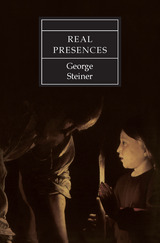
"A real tour de force. . . . All the virtues of the author's astounding intelligence and compelling rhetoric are evident from the first sentence onward."—Anthony C. Yu, Journal of Religion
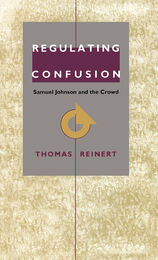
Ambivalent about the disruption, confusion, perplexity, and boundless variety apparent in the London of his day, Johnson was committed to the conventions of moral reflection but also troubled by the pressure to adopt the perspective of the crowd and the language of social theory. Regulating Confusion explores the consequences of his ambivalence and his attempt to order the chaos. It discusses his critique of moral generalizations, concept of moral reflection as a symbolic gesture, and account of what happens to the notion of character when individuals, having lost the support of moral convention, become faces in a crowd. Reflecting generally on the relationship between skepticism and political ideology, Reinert also discusses Johnson’s political skepticism and the forms of speculation and action it authorized.
Challenging prevalent psychologizing and humanistic interpretations, Regulating Confusion leaves behind the re-emergent view of Johnson as a reactionary ideologue and presents him in a theoretically sophisticated context. It offers his style of skepticism as a model of poise in the face of confusion about the nature of political truth and personal responsibility and demonstrates his value as a resource for students of culture struggling with contemporary debates about the relationship between literature and politics.
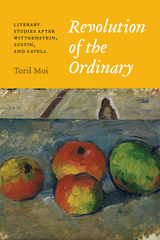
Moi first introduces Wittgenstein’s vision of language and theory, which refuses to reduce language to a matter of naming or representation, considers theory’s desire for generality doomed to failure, and brings out the philosophical power of the particular case. Contrasting ordinary language philosophy with dominant strands of Saussurean and post-Saussurean thought, she highlights the former’s originality, critical power, and potential for creative use. Finally, she challenges the belief that good critics always read below the surface, proposing instead an innovative view of texts as expression and action, and of reading as an act of acknowledgment. Intervening in cutting-edge debates while bringing Wittgenstein, Austin, and Cavell to new readers, Revolution of the Ordinary will appeal beyond literary studies to anyone looking for a philosophically serious account of why words matter.
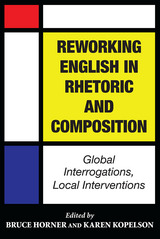
In Reworking English in Rhetoric and Composition, editors Bruce Horner and Karen Kopelson gather leading scholars and new voices in the field of rhetoric and composition to offer a dynamic new perspective on English as it is used today. This provocative volume explores the myriad ways in which English is constantly redefined, revised, and redirected through specific, located acts of writing, rhetoric, teaching, and learning. Contributors provide insightful contributions to the study of English from both national and international perspectives, revealing the language as a fluid and constantly changing manner of expression that challenges established notions.
In part one, “Reworking Language,” writers call into question the idea of language as a static, stable entity. In part two, “Locations and Migrations: Global/Local Interrogations,” contributors explore the impact of writing and teaching English in both in the United States and abroad, from Arkansas and Oklahoma to China, Jamaica, and Lebanon. Part three, “Pedagogical/Institutional Interventions,” addresses English in institutional settings and the implications for future pedagogical work. Each essay in this revolutionary volume substantiates two key premises for the rethinking of English: first, that languages are susceptible to constant change through the very acts of writing, teaching, and learning, and second, that this reworking occurs as it moves between various temporal and spatial locations.
Throughout the volume, the variety and flexibility of English across the globe are both advocated and revealed, rejecting dominant Anglophone perspectives and instead placing language in cross-cultural contexts. Brimming with informative and thought-provoking insights, Reworking English in Rhetoric and Composition breathes new life into the field and provides direction for scholars and teachers looking to the future of English.

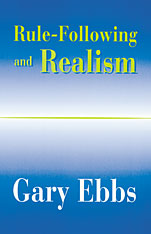
Through detailed and trenchant criticism of standard interpretations of some of the key arguments in analytical philosophy over the last sixty years, this book arrives at a new conception of the proper starting point and task of the philosophy of language.
To understand central topics in the philosophy of language and mind, Gary Ebbs contends, we must investigate them from our perspective as participants in shared linguistic practices; but our efforts at adopting this participant perspective are limited by our lingering loyalties to metaphysical realism (the view that we can make objective assertions only if we can grasp metaphysically independent truth conditions) and scientific naturalism (the view that it is only within science that reality can be identified and described). In Rule-Following and Realism, Ebbs works to loosen the hold of these views by exposing their roots and developing a different way of looking at our linguistic practices.
Reexamining and extending influential arguments by Saul Kripke, W. V. Quine, Rudolf Carnap, Hilary Putnam, and Tyler Burge, Ebbs presents systematic redescriptions of our linguistic practices that transform our understanding of such central topics as rule-following, the analytic-synthetic distinction, realism, anti-individualism, the division of linguistic labor, self-knowledge, and skepticism.
READERS
Browse our collection.
PUBLISHERS
See BiblioVault's publisher services.
STUDENT SERVICES
Files for college accessibility offices.
UChicago Accessibility Resources
home | accessibility | search | about | contact us
BiblioVault ® 2001 - 2024
The University of Chicago Press









